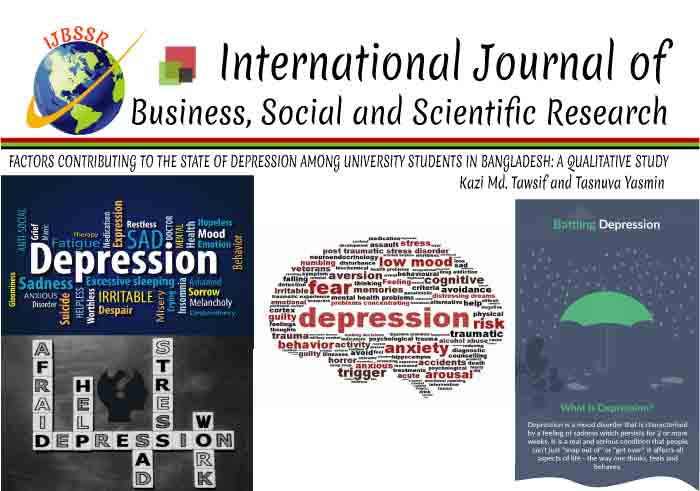FACTORS CONTRIBUTING TO THE STATE OF DEPRESSION AMONG UNIVERSITY STUDENTS IN BANGLADESH: A QUALITATIVE STUDY

The prevalence of depressive disorder among
young adults is reaching quite a threatening rate throughout the world. A
qualitative research approach was used to explore the factors leading to the
state of depression prevalent among the students of Khulna University,
Bangladesh during the period of January-March, 2020. The study was exploratory
in nature. Snowball sampling technique was used to determine the 25 respondents
interviewed through a semi-structured interview schedule. Collected data was
processed through transcript verbatim technique and thematic analysis of the
data was performed. Themes that emerged were, ‘Inconsistencies
between Want and Reality’ due to subjective social status and desire; ‘Overwhelming Expectation by Family and Societal Pressure’,
‘Uncertainty about Future’, ‘Lower Academic
Success’, ‘Taboo, Possessiveness and Betrayal Related to
Romantic Relationships’, ‘Traumatic Life Experiences’ and ‘Gender Specific Societal Pressure on Female’. The
influencing factors shaping university student’s depressive behavior are mostly
driven by socially constructed views and practices. However, increasing
counseling sessions for the students and their family members as well as social
awareness raising programs are essential to mitigate these factors. Hence, the
study can be beneficial in the sense that it can add some profound knowledge to
the existing literature hub regarding the depressed party’s perception of what
experiences lead them to this state. That perception can result into further
research initiatives regarding how to mitigate these factors so that the
probability of more students being depressed can be minimized.

